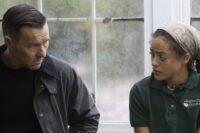Writer, director, and filmmaker Philip Gelatt has directed the films The Bleeding House (2011), They Remain (2018), The Spine of Night (2021, co-written and co-directed with Morgan Galen King). He also wrote scripts for the 2013 science fiction film Europa Report, directed by Sebastián Cordero, the video game Return of the Tomb Raider (2015), and multiple episodes of the Netflix series Love Death + Robots (2019-). He recently returned to his hometown of La Crosse, Wisconsin, for a screening of his 2D adult-themed animated fantasy film The Spine of Night, and spoke to Film Obsessive executive editor J Paul Johnson about his background and experiences in the industry. (The full video is embedded below; the transcript has been edited for length and clarity.)
What was it like to return home and share your work around friends and family?
It was a great experience. The Spine of Night came out earlier in the pandemic, so we had a theatrical release, but I wasn’t really able to travel with the film. I wasn’t able to go to film festivals with it except for maybe only one. So to get to play it in my hometown, in the theater that I grew up going to see movies, was a pretty amazing experience. I will also say The Spine of Night is not a “family-friendly” film, so it’s a little bit awkward to show. My parents didn’t come and everybody who did really, really enjoyed it. It was great.
So you are now a co-owner of the Rivoli Theater?
Yes. My siblings and I bought it almost exactly a year ago. The Rivoli in La Crosse is the oldest theater in La Crosse. It was built in the silent era, in the 1920s. I love history in general and old buildings in particular. We’ve seen the original designs and actually the very first upgrade they did was to add speakers because talkies had happened. It was built as a silent film theater, then became a talkie theater and has been there forever.
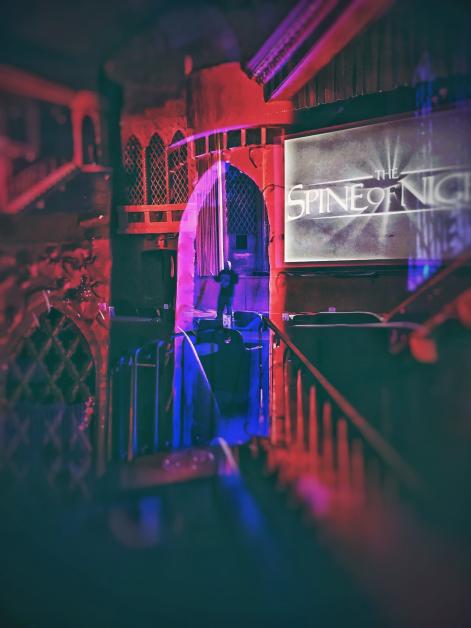
When we were growing up, It was a second-run theater. It’s a beautiful and amazing old place. The guy who had owned it for decades passed away during the pandemic. And so my siblings and I learned it was for sale, and they both live in La Crosse, and we decided that we’re going to buy it and keep running it as a movie theater, which has been wild. I work in film but I’ve never worked in exhibition before. It’s a whole other thing! But it’s been great so far. We’ve had it for a year and June is our one-year anniversary.
What do you see the role of a theater like the Rivoli as an arthouse or second-run theater? What’s you and your siblings’ vision for it? And what do you see the role of these kinds of theaters playing in the industry in the future?
My brother lived in New York for a long time and was a really big fan of the Nitehawk Cinema in Brooklyn and the Alamo Draft House. They’re not cineplexes, but they’re sort of curated, quirky, interesting, cool places to go see movies and you can get alcohol and you can get food and they play interesting things—things that reflect the people who are programming the movies. That’s the core vision of it right now.
It’s complicated because first of all, we exist in this in-between moment. We can play first-run movies, we can play repertory movies. And so we’re skirting the line between the two at the moment. For example, we played The Super Mario Bros. Movie and it was a massive success. At the same time, we also played The Spine of Night at 11 on a Saturday night. There’s no other movie house in the country that has played both of those movies on the same day! We want to keep that going.
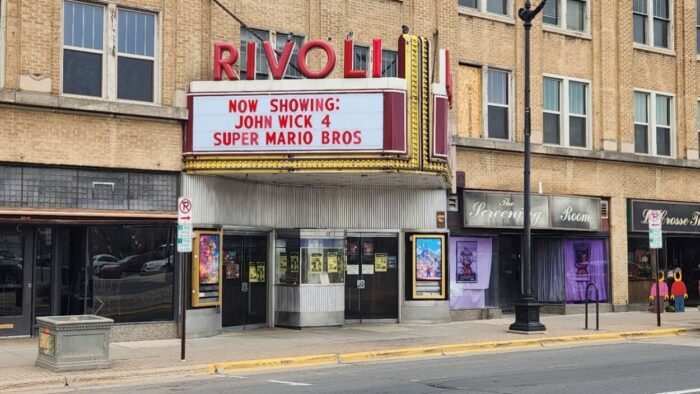
And globally, our hope with [The Rivoli] is that it is a place that continues to introduce for people who’ve never been to movie theaters before. It’s a place that they go and they have a good experience and they want to come back and go see movies in more and more. And for people who love movies and they sort of went away for a little while with the pandemic, but now they’re back. We want to make sure that it’s a special experience when you come and see something cool.
I’ll just share one anecdote which was really a clarifying moment for me. When I was there for The Spine of Night, I was behind the counter. I’m just rolling posters we’re giving away with the movie. Super Mario Brothers let out, right? It’s all kids and their families and one little girl, I’m not sure how old she was, is “excuse me, excuse me. I need to ask you a question.”
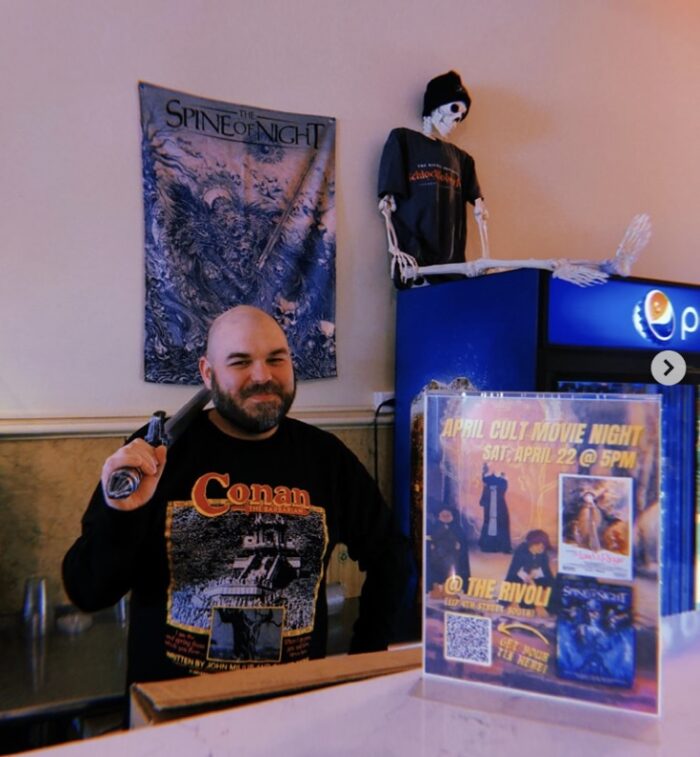
And this little girl had a ton of questions and it took me a while to understand what was going on. Her first question is, “Why are you showing two movies?” The subtext of all her questions was basically that she’d never been to a movie theater before. She didn’t understand what it was like. It was like the best thing I’ve ever heard because it was like this little girl who came and saw a movie, loved it, and wanted to understand like if she could come back and see something else and what other things might she see there.
So that was really great. There’s something in there that speaks to think what our hope for the theater is: you want it to be just a cool place to go, to do something with other people and see a great movie and have a good time.
What do you recall about your childhood that got you interested in films and filmmaking?
I grew up with movies. I grew up in the ’80s, so we had a VHS machine and I was always going to the Rivoli at that time. There were a bunch of other movie theaters in the cross. I loved them as a kid for sure. And I loved Indiana Jones and love Star Wars a lot. But I think if I had to really pinpoint the moment at which I like movies became my thing, there are a couple of them.
One summer a cousin of mine had this list of movies that he’d acquired. We watched Aliens a lot. Predator was on the list. So it was slightly an older set of movies, not so much Star Wars, Disney movies. That was big for me. And then my parents got divorced after the summer I was referring to. I don’t know if you want to call it escapism, probably a little bit, but I definitely remember the movies that I saw around that time, the movies where I was like, oh, this is really important to me. I’m not sure what the release dates are, but like Pulp Fiction is a very vivid memory. And I don’t know what the timespan between Pulp Fiction and Rodriguez’s Desperado is, but like I remember seeing that as well and the internet was around.
I didn’t really know how I understood there was a connection between the two films like I somehow knew that Tarantino was in Desperado and that they [he and Robert Rodriguez] had worked together. So that was the moment I start to really think about the people that make the movies too, and just like who they were, and what they were doing around that time. I also got into John Woo and movies. It was a realization that there were other types of filmmaking and they were filmmakers making movies that probably really got me on the path that I ended up on.
You went to school specifically for film?
To be totally honest, when I went into college, I never thought I was going to make movies. The program that I entered was a cinema studies program. So it was watching a lot of movies and thinking a lot and writing a lot about movies. Reading a lot of critical theory that nobody really cares about, unless you happen to be in those particular departments.
The only class I ever took in college that was related specifically to making movies was a summer school class, an eight-week class on screenwriting taught by an actor. I didn’t really get into a path that would lead me to making them until after college, I got an internship at like an indie film company in New York and my job was amazing. I was an intern but I was like the script development intern, so I was reading their slush pile. Basically, they would hand me a pile of scripts over the weekend. I suddenly realized, you know, these are all really bad. I could probably write something better than these. It might not be great, but I could probably do better than the majority of the scripts I was reading. And that’s really the moment at which I started on the path that has led me to everything else.
And then when did you feel like this was who you were and this was the thing that you would be doing?
I don’t know if I’ve had that feeling! Yeah, I’m in my 40s now, and I’m still occasionally wondering, maybe I should do something else. The first draft of the first script I wrote was very much me thinking about everything that I like in movies and cramming it all together. So it was like horror and science fiction and it was sort of like surreal and strange. It looks like everything crammed together. But it was good enough that the people I was working for said “hey, this isn’t bad, we’ll help you develop it.”
So that was a moment when sort of validating when it’s like, oh, here’s, here’s somebody who thinks they can make money off of you, which is ultimately what an agent is. I will say at this point in my life, there’s probably nothing else I could do.
You’ve both adapted other people’s works, like the story -30- for They Remain, and written your own screenplays for The Spine of Night and episodes of Love Death + Robots. Are you the type to make an appointment with a keyboard every morning or do you wait for inspiration to come?
At this point I tend to prefer to adapt something because I’m a coward and it’s much easier to look at something and be like, the horror of the blank page is erased, right? Because you see it and you can understand what it is and you can pinpoint what you like about it. And then as you’re adapting it, there’s still a lot of creativity there, but you always have a kind of guiding North Star that’s leading you forward creatively.
But I still do original work in my writing. Those ones are hard to come up with, honestly. I was joking about the first script I wrote where I took everything and crammed it together. But that’s still how I generate new stuff. And oftentimes it’s as simple as going to my bookshelf and thinking, Oh, what if this character from this book was involved in a situation like that character in that book. It’s sort of like a mixing and matching circumstances and characters and ideas to see if they lead somewhere new and interesting.
In terms of process, I write every day. It depends on where the process I am like if I’m doing a first draft, which is always the most painful thing in the world to do. I will, because of that, be very stringent as I write. At least six script scripted pages a day until that rough draft is done, just so it can get done. If I’m not sticking to that, it’s so easy to think, well, this is garbage. I have to force myself to get through it.
But you know, there’s, there’s so many different stages to writing. If there’s an outline I’m working on, I’ll I have no set amount I’m going to do but I tried to look at it every day because if you don’t look at it every day, it’s never going to get done. And then rewriting a script is actually my favorite thing because there’s no blank page. All the ideas are there. They may not be great, but you can then you can really get your hands dirty and massage it and move things around. So even while rewriting, I tried to have a set page number that I’m going to rewrite on a day. Usually it’s at least ten because it’s just, it’s faster and it’s not so hard for me to do it so that I can get more of it done.
In your press material for The Spine of Night, you mentioned that the world was feeling increasingly “like a nightmare” and maybe “some sick cosmic joke.” Do you recall when you felt that way specifically, and how that film is reflective of that sentiment?
That film took a long time to come together. Morgan (Walen King), my co-writer and co-director, and I wrote that script a long time ago, probably nine years ago. And it’s a sword-and-sorcery fantasy film, but it’s pretty dark in its conception of mankind and power. It was always running through the DNA of that film that it takes a broadly bleak view of existence. I was definitely referring to the pandemic and just the general state of probably mid-2020s, regardless of your politics, a very difficult time, in the middle of a pandemic. And just this general sense that whatever order of the world there might be, it’s always in danger of eroding. Generally, I guess I’m a pessimistic optimist or an optimistic pessimist. So it’s probably slightly darker than I would normally code things, but I don’t disagree with myself.
Was The Spine of Night always intended to be an animated film? Was there ever a thought to directing it as live action?
It was always going to be animated. The genesis of that project is Morgan, again, my co-writer, co-director had made a short film called Exordium that was set in the same world with The Spine of Night. And I saw it back in 2013 or so and loved it. And I thought it was exactly the kind of fantasy that I love. So I just approached him online and said, “Hey, I love this, let’s do something together.”
But I assumed that, given the way Hollywood works, I was never going to be to make a giant fantasy film epic. Unless I work with Morgan and made one animated because I thought we could do it independently, and I thought we’d be able to make whatever we wanted and be able to do all the wild stuff that’s in the movie.
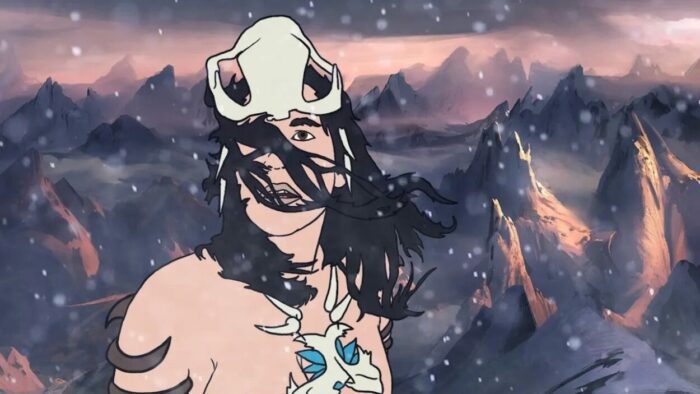
We were always thinking of it as animated. It came from Morgan’s specific style of rotoscoping animation. And we always thought animation was the only way we’re gonna be able to do it. I don’t think anybody would have let us make that movie live-action. I also don’t think anybody would have let us make that movie animated, which is to say we just went off and made it. At no point did we really have to ask anybody for permission to do anything. It is I can probably say a movie in which we serviced no notes except our own. It was just like whatever we wanted to do was what we did.
In that regard The Spine of Night is positively brave and audacious and in some ways almost unimaginable. No one else is making films like that these days. Do commercial considerations enter your decision-making process?
I tend to have two buckets in my mind for the work that I do.
One is the like the stuff that I’m paid to write, like Love Death + Robots. Basically, my day job is screenwriter. I tend to think probably too much about the commercial aspects of it, like what are the IP, because if you do it long enough and if you exist in that system, the Hollywood system, for long it just gets beaten into your brain that you have to think about this commercial data. I think that’s why a lot of movies feel the same. They’re coming from a similar set of instincts that are creative instincts, but they’re also driven by commercial needs.
The Spine of Night comes from a totally other place where I wanted to make the movie that I wanted to make or that Morgan and I wanted to make. There still is a commercial consideration there: I mean, we obviously want people to see it. Otherwise why do it? We didn’t start with Patton Oswalt or Lucy Lawless or or Richard E. Grant as voice actors. We brought them in at the end in the hopes of getting people to come see it because they want to hear them do a great performance. (Lucy Lawless is really fantastic.)
But I am even still probably woefully naïve about what audiences actually want to see. Game of Thrones is huge and people love Lord of the Rings. And we are firmly within those genres. We don’t have a big marquee IP, but we’re within those genres and we are doing it differently and it’s animated. Obviously there’s differences, but to me, they’re, there should be a direct line from those audiences to us. I can say, I mean, the movie has been reasonably successful and obviously it wasn’t a huge breakout hit. What I can say I’ve learned from that is that the hump to get people, particularly Americans, to see an adult animated feature film, is hard. People see that it’s a cartoon and it gets immediately pushed aside as something that’s not for them. Which is deeply annoying to me. That’s probably it is a aesthetic commercial problem that will be solved after I’m dead, but I will work hard until I am such to get them to get past it!
I’m curious just about the process of moving through pre-production, production, post-production for a film like The Spine of Night.
The animation style we’re using is explicitly based on the rotoscoping that Ralph Bakshi was doing on Fire and Ice and his other movies. Morgan reverse engineered it. It’s a very famous style of animation, of course. I thought we’re going to put out the call for animators who could work in that style, and there were going to be a lot of animators who were like, “Oh, finally, this is the thing I’ve always wanted to do.” That is not true. That is, that is or at least not in our experience.
So we basically had a very, very hard time finding anybody that could do the style even a little bit because like rotoscoping is pooh-poohed, even among the animators’ community. It’s a really difficult style. So I was surprised that it was so hard to find animators that could do it. That caught me off guard.
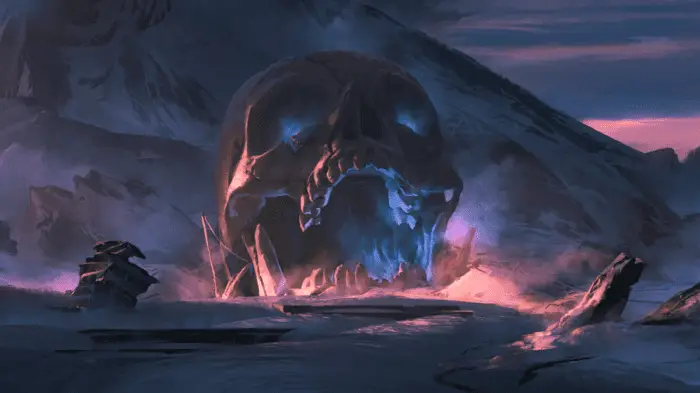
I think the other parts of the animation process are all really fascinating. There’s so much you can do with it. There’s so much to malleability to the visuals and those sorts of things. I really, I love it. Like I say, I wish that there was more of it out there than there is that was wilder and more visually invented. The Spider-Verse films are a good example there. What’s frustrating about it is, it’s literally you can do anything, anything you can imagine, you can put it in an animated film. So therefore, I wish there was wilder stuff instead of just stuff for kids, but that’s fine. I’m not wrong.
Is Love, Death, + Robots continuing?
There is a fourth season. At the moment. I’m on a couple of other projects, so I’m not actually even sure if I’ll be on Season Four. They might they might need to find other people to do it, but I’m not sure. We’ll see.
At this point, I’ve written a lot of animated shorts. I’ve been doing video game writing as well, one called Amnesia: The Bunker, which is a part of a horror franchise, comes out in May. People like that sort of stuff. It’s really, really good. I’m really, really happy with how it turned out. Then I’m working on another animated series for Amazon that’s unannounced, that’s with the same people that do Love Death + Robots.
So I’m working on that at the moment. So much of screenwriting life is stuff that may or may not happen. So I’m just I’m looking at my post date where I have all the current projects, all of which are all so far from fruition that they’re not even really worth discussing. But I’m constantly juggling projects.
I like to ask people who are in the industry if they’ve got advice for that next generation following along—maybe those people who are like you were a couple of decades back, a young kid in a small town with maybe a big dream or two?
My advice would be well, read and watch as much as you can. Because I think you have to. If you’re gonna do something, you’d behooves you to understand what’s been done before. It can be inspired by or to maybe even more useful to push against, like find something that you hate. I have to make something that’s better than it is, whatever emotion you need to just start, find it and use it.
Also, it took me a long time to develop a certain discipline in terms of writing, like as we talked about before, I think working on that is really important. Like, you know, these things seem like tautologies that are self-evident, but if you don’t do it, right, you can think about all you want, but you do like sitting down and see actually doing it as important.
Then my other piece of advice is don’t be afraid to be weird. Whatever form visual or sensory entertainment takes in the next decade, nobody really knows. Maybe the 90-minute film survives. Maybe it all just crumbles away into short TikTok videos. Who knows? But regardless of what it is, the job is to find your voice, to find what makes you weird and interesting and unique and do it.
So that might seem to contradict my advice to read and watch as much as you can, but I just think it’s part of it because it’s really how you figure out your own voice. You do have to chew your way or digest your way or watch your way through what’s come before it. It’ll help you hone your particular set of skills and your particular thing that you want to do.
A pretty obvious one at this point to anybody who has a phone in their pocket, but everybody has a cameras, and anybody can make a thing. The problem really now is getting people to watch the thing. But go ahead and start making it like there’s no there’s really no reason not to.
So: read, watch, be weird. Be angry, then just start doing it. Those are my final words of wisdom.
Thank you so much for taking the time to speak with us at Film Obsessive, Phil. We appreciate it very much and we look forward to seeing more of your work in the future.
Thank you so much.



